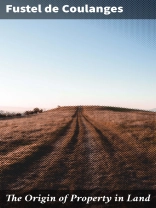Fustel de Coulanges’ 'The Origin of Property in Land’ delves into the intricate relationship between land ownership and social structures in ancient societies. Through a meticulous examination of historical legal frameworks, the author elucidates how property concepts evolved from communal ownership to individual rights, emphasizing the interplay between culture, religion, and law. The text is characterized by its analytical rigor and a narrative style that weaves together historical context with philosophical inquiry, reflecting the intellectual currents of 19th-century France, particularly the influence of legal positivism and historicism. Fustel de Coulanges, a distinguished French historian and scholar, is best known for his pioneering works on the ancient Roman and Gallo-Roman worlds. His background in classical studies and commitment to historical authenticity provided a robust foundation for exploring property rights, which were deeply intertwined with the religious and familial ties of early civilizations. The author’s examination of land ownership reflects his broader interest in the evolution of social institutions and their impact on the individual. This book is essential for readers intrigued by the foundations of property rights and their socio-economic implications. Coulanges’ thoughtful exploration offers invaluable insights for scholars and laypersons alike, making it a pivotal read for anyone interested in the historical underpinnings of modern property systems.
Fustel de Coulanges
The Origin of Property in Land [EPUB ebook]
With an introductory chapter on the English manor by W. J. Ashley
The Origin of Property in Land [EPUB ebook]
With an introductory chapter on the English manor by W. J. Ashley
Kup ten ebook, a 1 kolejny otrzymasz GRATIS!
Język Angielski ● Format EPUB ● Strony 129 ● ISBN 4064066423841 ● Rozmiar pliku 0.6 MB ● Tłumacz Margaret Ashley ● Wydawca Good Press ● Miasto Prague ● Kraj CZ ● Opublikowany 2022 ● Do pobrania 24 miesięcy ● Waluta EUR ● ID 8512309 ● Ochrona przed kopiowaniem Społeczny DRM












